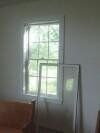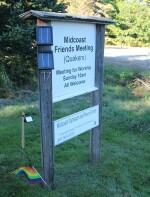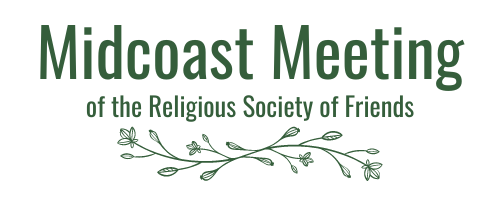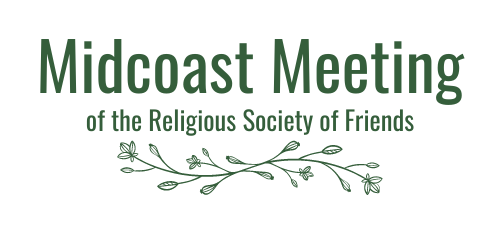Green Building
Environmental Concerns
From the Advices:
Stewardship - Friends are advised to consider our possessions as God's gifts, entrusted to us for responsible use. Let us free our time and our abilities to be able to follow the leadings of the Spirit. Let us cherish the beauty and variety of the world. Friends are urged to speak out boldly against the destruction of the world's resources and the difficulties that destruction prepares for the future generations. Let us guard against waste and resist our extravagant consumption, which contributes to inequities and impoverishment of life in our own and other societies. Let us show a loving consideration for all God's creatures. Let kindness know no limits.
Friends have traditionally maintained an active concern for the well being of the planet and its finite resources and Midcoast Meeting addresses these concerns directly.
Building Energy Audit
In October 2018, we had an energy audit conducted on the building to learn about our carbon footprint and learn of any improvements we can make to the energy efficiency of the building. Click here to see the audit report. Overall the building is in very good condition and it already quite tight and efficient. We have made some changes, such as sealing interior air leaks and adding insulation to all the hot water pipes in the basement. Other improvements being considered could both reduce our carbon footprint and further lower our operating costs.
Solar
On June 19, 2016 Friends approved a plan to host a solar farm on the property that would allow 9 subscribers to gain access to solar power.
The Farm was installed by ReVision Energy in the spring of 2017 and activated in June. The co-op subscribers benefit from the energy it produces. A portion of the energy produced by the farm is used to offset their electric bill every month. The Meeting leases the land to the co-op owners for a modest annual fee.
A web page for the Solar Farm shows performance metrics.

A web page for the Solar Farm shows performance metrics.
On August 12th of 2008 we installed 3 solar panels on the south facing roof of the building that can generate up to 510 Watts, and an inverter converts the solar energy to 120 Volts. This power offsets a portion of the electrical consumption of the building on an annual basis. During sunny daylight hours the building actually exports a modest amount of power to the grid. Guy Marsden assisted Naoto Inoue of Solar Market in Arundel in installing and wiring up the panels.
Photos: George Waldman, Guy Marsden
Heating with biofuel
Midcoast Meeting currently heats the building with a B5 (5%) biofuel mixture provided by Seacoast Energy. In October 2018 we explored switching to air source heat pumps and found the installation cost to be prohibitive after reviewing 3 bids.
Programmable Thermostats
There are three digital programmable thermostats that can be set for up to four different times for each day. We change the programming for these according to scheduled events throughout the colder months. The building is set back to around 50°F when it is not in use.
Efficient lighting
We instituted a project in the fall of 2003 to replace all 25 of the high wattage incandescent flood lights in the Meetinghouse with energy saving compact fluorescent (CFL) lamps. The project called for members and visitors to "sponsor" the replacement of each lamp. Many members can still fondly recall which lamp they sponsored. As these lamps wear out we are replacing them with LED flood lights.
Parking lot lighting
When we installed lights mounted to 8ft wood posts around our parking area, we used compact fluorescent flood lights. We struggled with how to control them and started with a standard 24 hour timer, but the lights were left on every evening when they were not needed. We replaced that timer with a wind-up timer switch by the front door that allows the lights to be activated for up to 4 hours as needed for evening events.
Reducing waste
In 2012 we re-configured the kitchen to make room for a dishwasher that reduces the amount of water required to wash dishes. To eliminate paper cups members were asked to bring in their old coffee mugs and a special shelf was built for them above the refreshments table. We had previously made a commitment to reduce waste in our kitchen by eliminating paper plates and adding separate containers for recyclables and redeemables under the refreshments table where they are visible and accessible. A compost bin on the kitchen counter holds compost before it goes out to a bin installed behind the building for kitchen waste.
Reducing oil usage for hot water
In the summer of 2008 we changed the plumbing in our building because the water was being heated by the oil boiler that also heats the building. This meant that the big oil burner was coming on throughout the warm seasons just to maintain heat in a 40 gallon tank that is rarely used. So we bypassed that system and installed a small 4 gallon electric heater that is fed from the original oil heated tank which now tempers the incoming well water. We installed a timer in the basement so that we can still use the oil boiler to heat water on Sundays when we need more hot water for cleaning dishes than the small electric heater can provide.

Insulating Windows
We installed interior insulating window panels in 8 of the windows. Guy Marsden lead a workshop to demonstrate how to make these windows and the community made them all. These simple, inexpensive panels will triple the insulation of the windows while still allowing sunlight to enter and warm the building in the winter. Detailed instructions for building them can be found here on Guy's web site.
Replacing EXIT signs with non powered units
In September 2010 we replaced all the lighted EXIT signs that consumed nearly 30 Watts each with phosphorescent signs that use no power. The new signs charge up from ambient UV light and glow for hours afterward.
Solar lights on the road sign
We have installed solar powered lights on both sides of the sign at the driveway entrance. This inexpensive lighting system is carbon neutral and saved the expense of running power over 100 feet to the sign. The solar panels on the post charge batteries in the daytime. The bright LED lights come on at dusk and automatically and shut off after 6 hours.

Electric Vehicle Charging outlet
In May 2012 one of our members acquired an electric vehicle (Chevy Volt) and asked the Meeting for permission to install an electric outlet on the front porch to be used as a charging station. The Meeting supported this wholeheartedly and the outlet was installed shortly thereafter. An electric vehicle can gain approximately 5 miles range for every hour that it is plugged in to 120 Volts. The electricity costs around 25 cents/hour to charge a Volt here in Maine. Many of our members drive hybrid, plug-in hybrid or electric vehicles.
Green Building
Quaker Eco-Witness is a project of the Friends Committee on Unity with Nature and the Environmental Working Group of Philadelphia Yearly Meeting. The committee offers these observations:
We believe the human-earth relationship in all its aspects inseparable from the divine. We are convinced that the current economic system should be of urgent concern to the Religious Society of Friends. It is intensifying economic and social inequities throughout he world, causing structural and physical violence, driving many species to extinction, and leading our own species toward ecological self destruction.
Quaker Eco-Witness has prepared a series of questions concerning the restoration of the earth's ecological integrity, and the economic policies that affect us all.
- In the light of Friend's testimonies, what is God calling us to do about the continuing and increasing marginalization of so much of the world's population, the extinction of the species, and other environmental degradation?
- How do we integrate our human community within the natural world so as to provide for the physical and spiritual needs of future generations?
- What chances in the institutions of economy and governance are needed to promote effective stewardship of the natural environment and caring for people and communities?
- What is it in nature and human knowledge that we have the right to own?
- How best can we provide the values expressed in the Universal Declaration of Human Rights and the Earth Charter?
- How can we promote the understanding and awareness of the consequences of increasing global interconnectedness and the urgency of addressing the dangers an opportunities that these present?
- As we earn, spend, and invest money, as individuals and as Meeting communities, how can we live in the "virtue of that life and power" that leads us to treat all humans and the Earth as a manifestation of the Divine?
- Are we aware of the true cost of our consumption?
- Do we take into account our concerns for social justice as we earn, spend, and invest money?
- What information, tools, and skills do we need to equip ourselves to work effectively for public policies that restore Earth's resilience, increase social equity, and strengthen our community?
- How can we engage with others in ways that help us discern God's will for us, at this critical stage in Earth's history, as we labor with these concerns?












